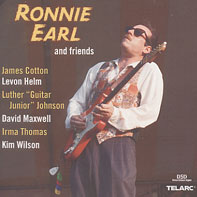 Ronnie Earl is held in high respect in the blues world. The level of respect is reflected in the list of friends who appear on his latest album, "Ronnie Earl and Friends." The idea was to try and recreate the spirit of the recorded jam sessions which sometimes happened in the 1960's. "Ronnie Earl and Friends" shows that those who came to play certainly delivered.
Ronnie Earl is held in high respect in the blues world. The level of respect is reflected in the list of friends who appear on his latest album, "Ronnie Earl and Friends." The idea was to try and recreate the spirit of the recorded jam sessions which sometimes happened in the 1960's. "Ronnie Earl and Friends" shows that those who came to play certainly delivered.
The album opens with Magic Sam's "All Your Love" where the first guest, Luther Guitar Jr Johnson slots right into the groove. There is an obvious chemistry between Johnson and Earl, and the results certainly give the original a run for its money. It sets a standard which is at least matched by the rest of the album. In one or two places it is even surpassed, such as the romp through "Mighty Fine Boogie" where Kim Wilson sings and duels on harp with James Cotton, and a tremendous rendition of Eddie Taylor's "Bad Boy," which also features Johnson.
Among the other notable guests are Irma Thomas, and David Maxwell, who both bring something to the party. Thomas' first cut is eight minutes of soul, combining Brook Benton's "I'll Take Care of You" and Doc Pomus' "Lonely Avenue." Thomas is in terrific voice, and Earl's playing provides the perfect soulful foil for it. She returns for "New Vietnam Blues," which was inspired by Junior Wells' "Viet Cong Blues." After that, Maxwell gets the chance to stretch his fingers on Otis Spann's "Marie."
Although for the most part Earl is happy to let his friends take their share of the limelight, he does take a couple of chances to dominate proceedings. The first is the original instrumental, "Twenty-five Days" where you get a chance to more fully appreciate Earl's talents as a guitarist and writer. The other chance is on the closing track, where Magic Sam's back catalog is revisited for a solo trip around the excellent, but all-too-short "Feeling Good." It certainly left this reviewer wanting more.
Telarc (www.telarc.com) have developed a reputation for turning out quality blues albums, and "Ronnie Earl and Friends" maintains the standard. It also serves to increase the standing of Ronnie Earl as one of the best guitarists around. Earl is much more than a blues guitarist, and perhaps the best comparisons for anyone who has never heard him before--if such people still exist--is Kenny Burrell or Dave Specter (or Sonny Black in the UK). Whether you are an Earl fan in particular, or just a blues fan in general, "Ronnie Earl and Friends" is one of those "must have" CDs that should be in the reckoning when the next set of Handy's get shared out.
This review is copyright © 2001 by Gordon Baxter, and Blues On Stage at: www.mnblues.com, all rights reserved. Copy, duplication or download prohibited without written permission. For permission to use this review please send an E-mail to Ray Stiles.
